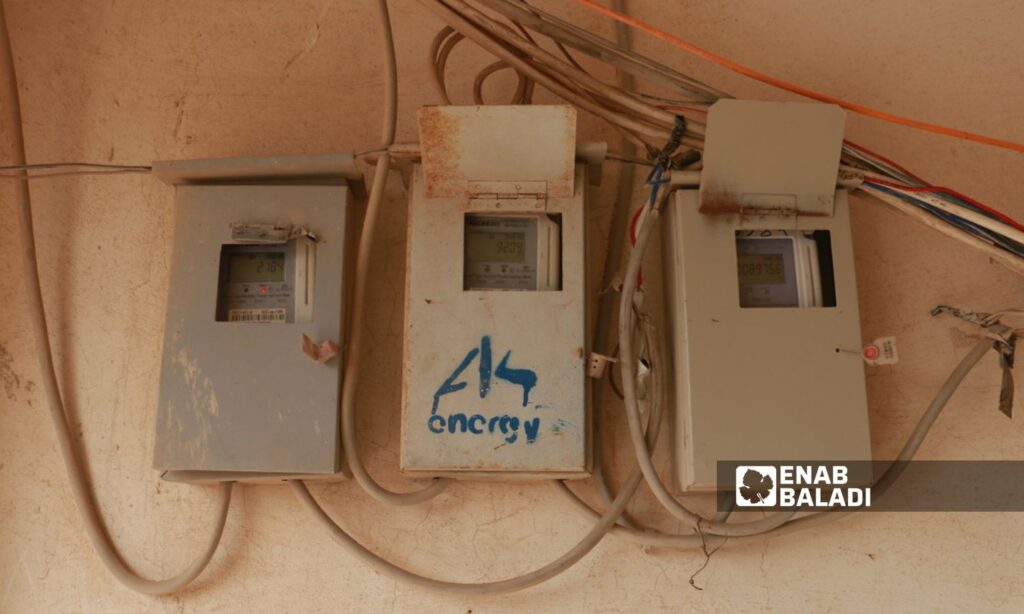Azaz – Dayan Junpaz
Six masked people appeared in a video recording on October 30, and the speaker among them pledged to target the Turkish AK ENERGY company operating in the border city of Azaz in the northern countryside of Aleppo, target its interests, and prevent the company’s workers from repairing faults until their demands are met.
During the recording, the speaker called for adjusting the prices of electricity in the Sajo IDP camps near Azaz city and providing it at the prices of nearby towns and villages, as electricity reaches these camps through local contractors at a cost of 5.5 Turkish liras per kilowatt, while a kilowatt is sold in Azaz for 2.95 Turkish liras.
($1= 28.90 Turkish lira)
One day after the recording, Azaz city and its neighboring villages witnessed a power outage for up to 20 hours, divided over three days, following the shooting of bullets on the supply line near the Bab al-Salama border crossing in the village of Sajo without knowing the perpetrators.
The issue of high electricity prices in the displaced camps is not new, but it has worsened because the company in question did not respond to the residents’ demands amid overlapping responsibilities between local councils, companies, and contractors in the northern region.
There are camps distributed around Azaz, some of which are organized (supported by volunteer teams and organizations and have more services than random camps), and their number is about 14 camps, including the old Bab al-Salama camp, the new Bab al-Salama, Sajo Caravans, and al-Rayyan and al-Nour camp.
There are scattered random camps, estimated at about 22 camps, including Maaramin, Yazi Bagh, al-Rahma, Shammarkh, and others.
These camps host displaced families from all Syrian regions and extend along the road towards the Bab al-Salama border crossing with Turkey.
Double prices
What worries camp residents most is their lack of equality with nearby towns and villages in terms of prices, which imposes additional financial burdens on them and pushes them to choose to dispense with electricity amid a deteriorating living reality.
Electricity prices make the lives of camp residents more complicated, especially in light of the economic difficulties and continuous high unemployment rates.
The concerned families called for urgent measures to be taken to address this problem, whether by providing financial support or reducing electricity prices in the camps.
Mahmoud Junaid, an IDP, told Enab Baladi that the high cost of electricity places a heavy burden on the residents and displaced people in the camps in light of the unemployment crisis and the lack of job opportunities.
Junaid stated that the people are waiting for the relief basket, which arrives once a month, to sell the food items it contains, such as bulgur, rice, lentils, and oil, at prices of up to 100 TL, to provide the money necessary to bear the costs of electricity.
For his part, Mohammad al-Azou, a resident of the camps, said that the IDPs are trying hard to reduce electricity consumption and limit themselves to urgent needs such as lighting and a washing machine, but the cost of electricity reaches about 3,000 TL per month.
Al-Azou added that saving this amount has become impossible, which prompted most of them to dispense with it.
Energy company disavows; Investor in camp electricity
Electricity prices are witnessing a continuous increase, sometimes with a slight decrease, and variation between one company and another without clear reasons, as three companies operate in areas controlled by the Syrian Interim Government (SIG) in the northern and eastern countryside of Aleppo and the cities of Ras al-Ain and Tal Abyad in northeastern Syria.
Towns and villages in Aleppo countryside have witnessed repeated protests against raising the price of electricity over the past years.
The demonstrations in the Aleppo countryside revealed a defect and lack of knowledge and coordination in local councils’ contracts with electricity companies, as well as the councils’ inability to control the work of electricity companies. Confusion appeared in varying reactions, including requests to file lawsuits or cancel contracts, and the matter reached the point of announcing resignations in some cases.
Mohammad Eid al-Madani, AK ENERGY’s public relations officer, told Enab Baladi that there is a private investor working inside the camps and dealing with the company separately and independently.
Al-Madani stated that the investor is preparing and installing the electricity infrastructure, including the lines, wires, and equipment necessary to deliver electricity to the camps, and electricity consumption is monitored through main meters placed at the entrances to each camp, and the investor is held accountable based on these readings, and according to contracts signed between the investor and the company in coordination with the local council of Azaz.
The PR officer pointed out that the company contracts at the price of the kilowatt sold in the city and has no role in determining electricity prices in the camps.
Enab Baladi tried to contact the head of the media office of the Azaz local council to obtain clarifications about the reasons for the high prices in the camps, but it did not receive a response until the moment this report was published.
Residents in the Aleppo countryside complain about the high prices of electricity compared to the deteriorating economic situation witnessed in northwestern Syria, as a family needs the equivalent of ten days’ work wages to pay monthly electricity costs.











